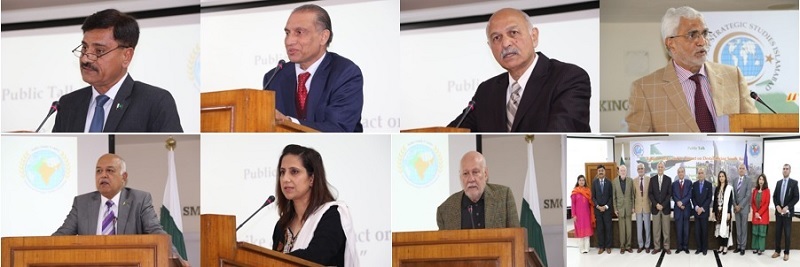Press Release
“Balakot Strike and its Impact on Destabilizing South Asia”
February 28, 2022

The India Study Centre (ISC) at the Institute of Strategic Studies Islamabad (ISSI) organised an event on the eve of 3rd anniversary of the Balakot Crisis entitled “Balakot Strike and its Impact on Destabilizing South Asia” on February 28, 2022.
While welcoming the guests, the Director India Study Centre Dr. Saif Malik said that three years ago on February 27, 2019, Pakistan busted the myth of Indian invincibility, and this day should be celebrated as a day of national pride.
Speaking at the occasion, the Director General ISSI Ambassador Aizaz Ahmad Chaudhry congratulated ISC for holding the event. He said that India wanted to replicate American tactics of conducting airstrikes and to set a new norm of engaging Pakistan at the conventional level. Unfortunately, the international community did not condemn Indian actions of violating the international law.
Air Marshal Farhat Hussain Khan, HI (M), (Retd), President, Centre for Aerospace & Security Studies (CASS), highlighted the topic “Operation Swift Retort and Future Challenges for PAF.” He said that in aftermath of the Indian airstrike, the stability in the region almost dropped to zero. This was an act of war under any definition of national security. He said that the Indian Air Force failed to engage any valuable target due to flawed planning and information. He emphasised that Pakistan should focus on the indigenization of non-kinetic means of warfare to frustrate any aggression.
Dr. Rizwana Abbasi, Associate Professor (IR), National University of Modern Languages (NUML), talked on the topic “Balakot Crisis and Strategic Stability in South Asia.” She said that Balakot incident was an example of Stability-Instability Paradox. India miscalculated that it could defy the deterrence of Pakistan; however, breaches do occur, but deterrence holds.
Lt. Gen. Asif Yasin Malik, HI (M), (Retd), talked on the topic “False Flag Operations – A Threat to Peace in South Asia.” He lauded the Pakistan Air Force for giving a tactical and strategic message to region and the whole world. He said that ideological borders are more important to defend than territorial borders. He highlighted the concept and history of false flag operations and its repeated use by India. He expressed frustration that within three hours of Mumbai Attacks in November 2008, the Indian media started blaming Pakistan.
Amb. Aziz Ahmad Khan, talked on the topic “Post Balakot Trends and Trajectory of India -Pakistan Relations.” He said that during the Zia-Rajiv talks, they agreed on 4-point track to manage the conflicts but excluded Kashmir on the Indian demand. He said that in the presence of Modi, the possibility of Indo-Pak talks is merely possible. He talked that Prime Minister Modi is likely to go ballistic against Pakistan if BJP loses the ongoing Uttar Pradesh Elections. He said that something like Balakot is likely to happen.
Senator Mushahid Hussain Syed appreciated the Pakistan Air Force for giving a befitting response to the Indian aggression. He said that India behaves like a bully and when Pakistan retaliated, it backed off. He said that there is an ongoing transformation taking place in India where Rashtriya Swayamsevak Sangh has taken over the Indian state. He expressed that under Modi, India has an ideological foreign policy and a strategic clarity towards Pakistan.












